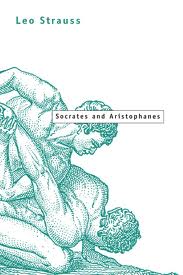Socrates and Aristophanes, Basic Books, 1966. Reprint: University of Chicago Press, 1980.
Excerpt:
Since Socrates did not write books or speeches, we depend entirely on other men’s reports for our knowledge of the circumstances in which, or of the reasons for which, political philosophy was founded. The difficulty is increased by the fact that the reports in question are not in entire agreement with one another. Our chief sources are the dialogues of Plato, some remarks of Aristotle, Xenophon’s Socratic writings, and Aristophanes’ Clouds. Aristotle did not know Socrates’ thought except through reports oral or written; Aristophanes, Xenophon, and Plot knew Socrates himself. While Xenophon and Plato were friends and admirers of Socrates, Aristophanes was not; he seems to present Socrates as a sophist in the Socratic sense of the term. As for the Platonic dialogues, their present-day use by scholars is ordinarily based on two decisions: on the distinction between genuine and spurious among those writings that the tradition has transmitted to us as genuine; and on the contention, which is partly based on the allegedly certain knowledge of the sequence in which the genuine dialogues were written, that only the early dialogues are Socratic or that they are, at any rate, more Socratic than the later ones. Whatever we might have to think of these decisions, the Platonic dialogues are admittedly not reports, but works of art; they do not permit us to distinguish incontestably between what Socrates himself thought and the thoughts that Plato merely ascribed to him. In a letter that has come down to us as Platonic, it is said, “There is not now nor will there be any writing of Plato; but those writings which are now said to be his belong to Socrates having become fair (noble) and young (new).” The Platonic dialogues “idealize” Socrates. Plato never vouches for the authenticity of his Socratic conversations. Plato is not a historian. The only historian among Socrates’ contemporaries on whose writings we must rely for our knowledge of Socrates is Xenophon, who continued Thucydides’ history, and who vouches for the authenticity of at least some of his Socratic conversations by introducing them with expressions like “I once heard him say.” there is then at least a prima-facie case in favor of the view that the primary source for our knowledge of Socrates is the Socratic writings of Xenophon. The study of these writings may compel us to modify that suggestion, but this does not detract from its usefulness. Not a few errors regarding Socrates that are at present rather powerful would have been avoided if the value of Xenophon’s testimony had not been dismissed as quickly and as rudely as it has been.
Online:
Google Books
Amazon

